Refinishing my 1979 4001 Autumnglo
Moderator: jingle_jangle
Re: Refinishing my 1979 4001 Autumnglo
I really like your refinish, great job! And I would use the short guard, much more "coherent" 
- aaronosaurus
- New member
- Posts: 6
- Joined: Thu Nov 06, 2014 11:13 pm
Re: Refinishing my 1979 4001 Autumnglo
Uff da! You Norskers have a lot of sayings. lolWiker wrote:
As we say in Norway: "personal taste is like the butt – divided down the middle". (In Norwegian it rimes and sounds much better).
Beautiful work Geir! Looks perfect, I don't think they come from the factory that nice. What finishes did you use?
And does the saying translate to Dansk?
Hilsens til dig.
"Well, two heads are better than one...... even if one of them is a sheeps head"........ (my Dad talking to me....)
Re: Refinishing my 1979 4001 Autumnglo
Thanks. I used Glasurit 923-335 (2K automotive clear) all the way – sealing coat, colour coat, and top coats. For the colour coat I added TransTint dye (StewMac calls it ColorTone) into the clear finish.aaronosaurus wrote:Uff da! You Norskers have a lot of sayings. lolWiker wrote:
As we say in Norway: "personal taste is like the butt – divided down the middle". (In Norwegian it rimes and sounds much better).
Beautiful work Geir! Looks perfect, I don't think they come from the factory that nice. What finishes did you use?
And does the saying translate to Dansk?
Hilsens til dig.
So, you’ve had, or have, some encounter with Danes or Denmark
Directly translated to Danish it will be something like ”smagen er ligesom røven, delt på midten.”
Yes, lots of sayings. For instance, ”owls in the moss” is an expression used when sensing that something is not quite right, not what it seems, or something fishy is going on.
Back in the really old days the language spoken in Norway was like the language in Iceland today. Today’s Norwegian is derived from Danish, the two languages are really close, and it’s very easy for a Norwegian to read Danish. However, the way Danes talk (as if they have a hot potato in their moth, as we say in Norway
Anyway. ”Owls in the moss” actually comes from the Danish saying “wolves in the marsh” (which obviously signifies ‘danger is lurking’, ‘not as safe as it seems’). But the Norwegians back then didn’t understand what the Danes were actually saying. Funny, one probably gets the same effect in English – if you say “wolves in the marsh” with a potato in you moth it can probably sound like ”owls in the moss”.
Re: Refinishing my 1979 4001 Autumnglo
An update just to show that I’m actually doing something.
Pick guard is(was) finished, but I’ve scratched it up so much now playing around with making a new the hardness that I’ll make a new fresh one.
To complete the white plastic against darker brown bass theme I’ve spent some time making a white nut for this bass.
While working on this bass I also made a thicker anchor block for the truss rods – a thicker block will resist more of the tilting force.
And, I always have to do/make things twice before I get it right so things take time.
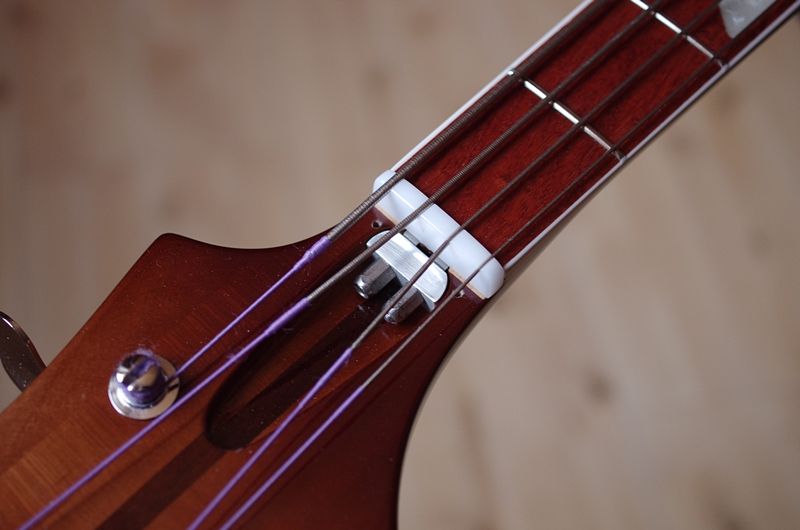
Back and forth, soldering and unsoldering, try out different tone caps and inline caps etc. (and scratching up the pick guard with all this back and forth)
In the end I had to make a harness-in-a-box to make testing simpler and for easier A/B testing by the flip of a switch.
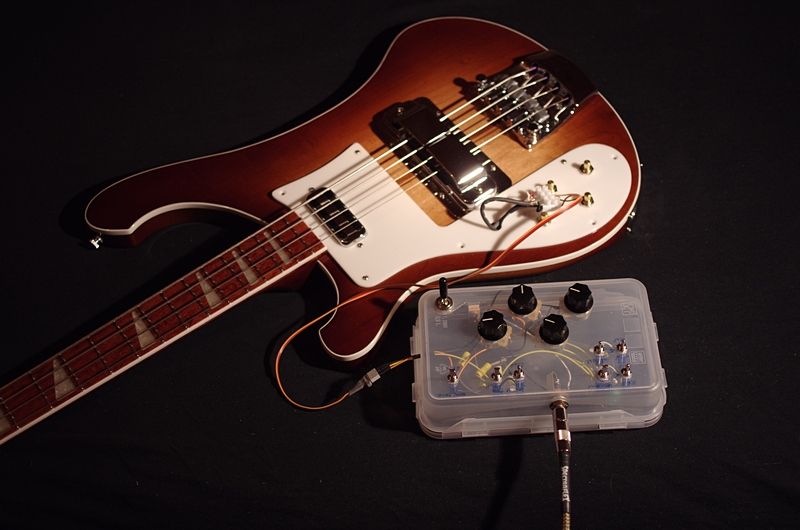
Pick guard is(was) finished, but I’ve scratched it up so much now playing around with making a new the hardness that I’ll make a new fresh one.
To complete the white plastic against darker brown bass theme I’ve spent some time making a white nut for this bass.
While working on this bass I also made a thicker anchor block for the truss rods – a thicker block will resist more of the tilting force.
And, I always have to do/make things twice before I get it right so things take time.

Back and forth, soldering and unsoldering, try out different tone caps and inline caps etc. (and scratching up the pick guard with all this back and forth)
In the end I had to make a harness-in-a-box to make testing simpler and for easier A/B testing by the flip of a switch.

- jingle_jangle
- RRF Moderator
- Posts: 22679
- Joined: Wed Dec 22, 2004 6:00 am
- Contact:
Re: Refinishing my 1979 4001 Autumnglo
Nice quality approach and great results all around!
Re: Refinishing my 1979 4001 Autumnglo
Thanksjingle_jangle wrote:Nice quality approach and great results all around!
Re: Refinishing my 1979 4001 Autumnglo
Eventual got around taking some photos of the finished bass, together with its younger sister. (We’re at the end of the dark season up here in the north, sun still bellow the horizon, so daylight isn’t very good.)
Not much original on this bass anymore (unfortunately some would say). Except for the wood itself, the only things original is the TRC and the bridge w/ saddles.
I’m quite satisfied with the way it turned out. Plays great with new frets and leveled fret board. And of course it sound fantastic with toaster and Lollar HS. A bit darker sounding than my V63.
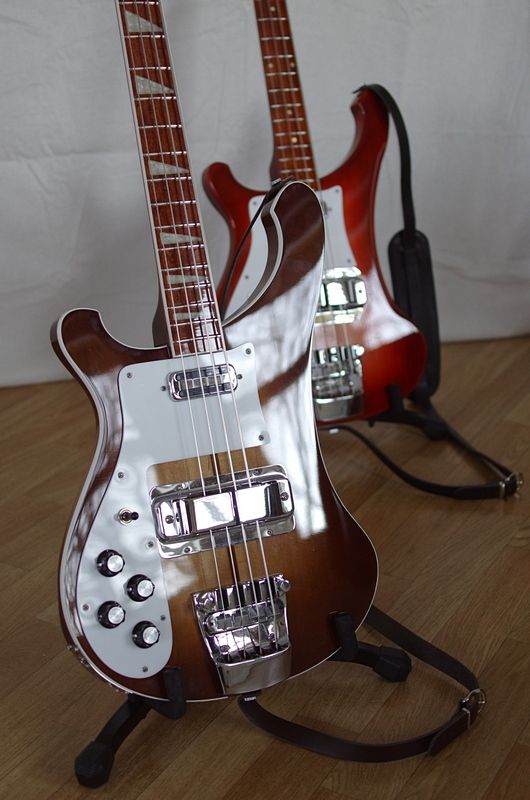
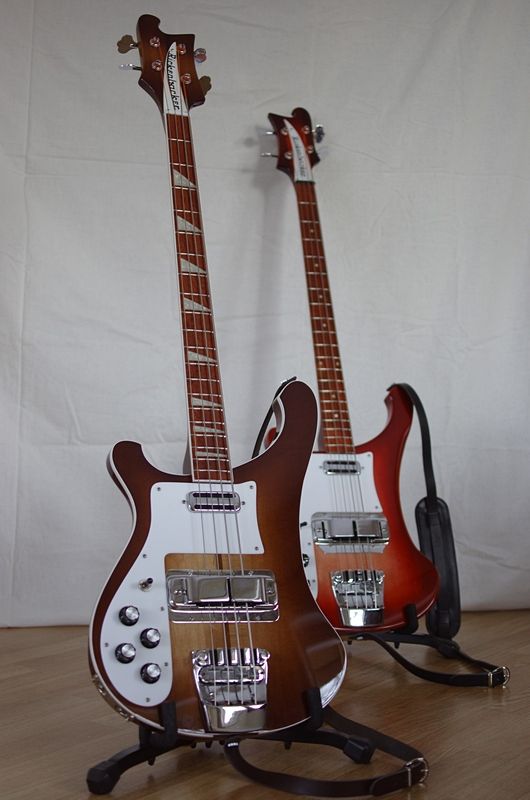
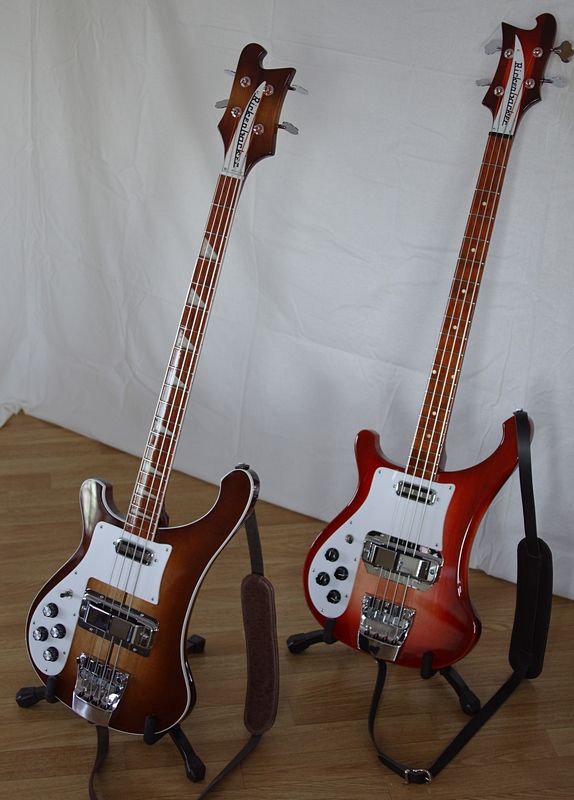
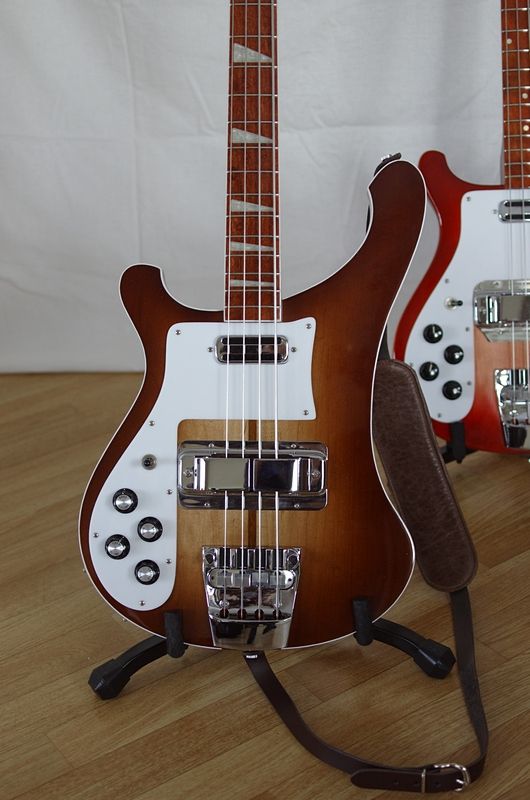
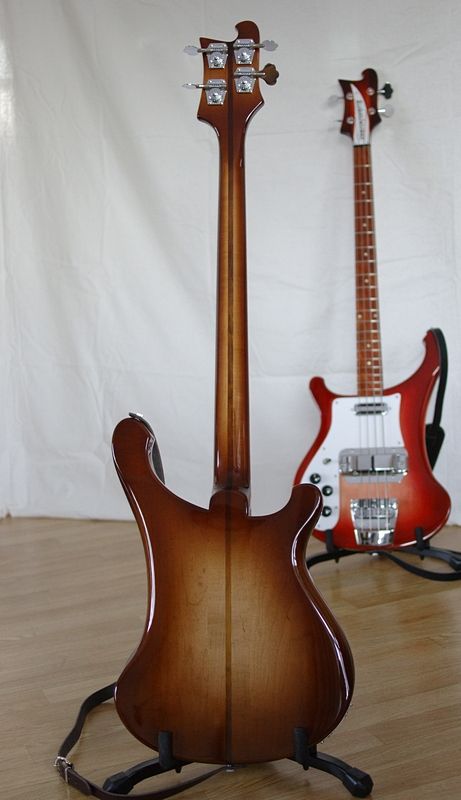
Not much original on this bass anymore (unfortunately some would say). Except for the wood itself, the only things original is the TRC and the bridge w/ saddles.
I’m quite satisfied with the way it turned out. Plays great with new frets and leveled fret board. And of course it sound fantastic with toaster and Lollar HS. A bit darker sounding than my V63.





Re: Refinishing my 1979 4001 Autumnglo
Looks smashable, er, I mean, smashing, Geir! 
Re: Refinishing my 1979 4001 Autumnglo
Geir.....Next to Sepp's 4002, that's the nicest looking walnut finish I've seen on a Rick. What did you end up settling on with the wiring?
Re: Refinishing my 1979 4001 Autumnglo
Thanks. 

For the bridge PU I think 47nF takes away too much (with tone is turned all the way down). Some years ago I’ve used 22nF, but in my ears it sounds a bit "hard". This time I went with 33nF for the bridge PU.
With the in-line cap I ended up the way I’ve had it for some time. I don’t like the sound with the normal 4.7nF, not even with both pickups together. So, I use 10nF instead of 4.7nF. And I move the in-line cap from its standard position in front of the volume pot, to after the volume pot. In that position it doesn’t thin down the sound, at least not when plugged into a high impedance input, but it still does something with the signal from the bridge PU that makes it blend much better with the neck PU.
I stayed with 47nF for the neck PU. 68nF and 100nF is great for a darker sound, but I didn’t want to the sacrifice the 47nF.aceonbass wrote:Geir.....Next to Sepp's 4002, that's the nicest looking walnut finish I've seen on a Rick. What did you end up settling on with the wiring?
For the bridge PU I think 47nF takes away too much (with tone is turned all the way down). Some years ago I’ve used 22nF, but in my ears it sounds a bit "hard". This time I went with 33nF for the bridge PU.
With the in-line cap I ended up the way I’ve had it for some time. I don’t like the sound with the normal 4.7nF, not even with both pickups together. So, I use 10nF instead of 4.7nF. And I move the in-line cap from its standard position in front of the volume pot, to after the volume pot. In that position it doesn’t thin down the sound, at least not when plugged into a high impedance input, but it still does something with the signal from the bridge PU that makes it blend much better with the neck PU.
